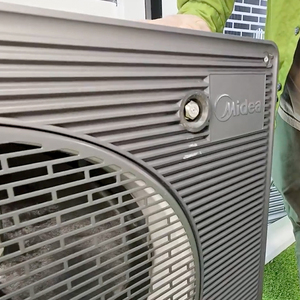Electrician’s and others’ opinions wanted. I have a place with old screw type fuses in the service panel. It seems that many insurance companies want these replaced with circuit breaker panels. Buss makes a Mini Breaker that replaces the screw fuses. Are these any good? Anyone have any experience in using these Mini Breakers?
If I were to replace all of the screw type fuses with these Mini Breakers can I then tell my insurance agent that the electrical service panels have no screw in fuses all the circuits are protected by a resettable circuit breaker?
Am I being penny wise and pound foolish with this idea?



















Replies
Is this panel the older 'Edison' type which all the fuses, no matter the size, screw in with the same threads as a normal light bulb? Or is it an 'S-type' in which the fuses have ceramic bases and are all different sizes, a 20A fuse won't fit into a 15A spot?
Of course given the likely age of either of these panels, the 'S-type' is newer, it would be wise to at least have the wiring looked over. I would likely, if I were looking at it, recommend at least a few new circuits be run. A couple of kitchen circuits and a bathroom circuit would be a good start. Any heavily loaded circuit is a good choice for updating.
Wiring doesn't last forever. Wear, tear and handymen take a toll. Your panel is likely 40 or 50 years old. Possibly older if it is an 'Edison' type or an 'Edison' converted to 'S-type' by adding inserts.
Yes they are the old light bulb base size fuses. 20 total circuits on three Federal panels with a sub panel with breakers for the air conditioner. There are separate circuits for the kitchen and baths. I don't think that any circuit is overloaded. Kitchen and baths are GFIC protected too via GFI outlets. House is 54 years old with a couple of remodels. I'm confident that the wiring is safe. My concern is with the Buss Mini Breakers as replacements for the fuses. Do you have any experience with them?
It sounds like you have a decent setup as is. The biggest single problem with most old fuse boxes is that there were only a limited number of fuses (eg, 8) and they are all overloaded. This made it even more tempting to give in to the other major problem -- the ability to substitute a higher-rated fuse in order to prevent an overloaded circuit from blowing.With 20 circuits you have enough that nothing should be overloaded. If you're disciplined enough to never use an oversized fuse, your setup should be quite safe.The mini-breakers you describe are intended as an alternative to frequently replacing a fuse (or using a larger one) on a frequently-overloaded circuit. In practice the mini-breakers are probably less reliable than your standard plug fuse, and certainly no more reliable. Since you don't (we're assuming) have any frequently-overloaded circuits and you're an upstanding guy who would never dream of using an oversized fuse, the mini-breakers are of no real use to you.The insurance companies are concerned with fuses for two reasons:1) The probability of having overloaded circuits and of using oversized fuses.
2) The fact that having fuses means that most of your wiring is fairly ancient.Simply replacing plug fuses with mini-breakers isn't going to change their opinion on either of these issues, AFAIK, though at least it would be cheap to try.
Re:"1) The probability of having overloaded circuits and of using oversized fuses.
2) The fact that having fuses means that most of your wiring is fairly ancient."I think you summed it up well with that.If he has 'Edison base' fuse holders the main weakness is that all fuses fit all fuse sockets, holders. IE: a 50A fuse fits a socket feeding a #14 wire that should have a 15A fuse. An easy solution would be to install conversion inserts to convert the fuse holders to 'S-type' fuses. Which are designed to take only a single fuse rating. Of course you have to be really careful about putting in those inserts. Nothing dangerous about it but if you get the wrong insert in the wrong socket they are, by design, a royal PITA to get back out. 'S-type' fuses are also designed to be slim enough to eliminate the use of a penny or slug. A penny fits well in an Edison socket and will make the circuit work but provides no protection. Essentially the wiring in the walls becomes the fuse. A great way to meet firemen if your into that sort of thing.As for fuses I don't worry about fuses much. They are actually more reliable and consistent in operation than circuit breakers. Fuses operate on a well understood property of physics and lack mechanical parts that can fail or adjustments that can drift out of specification. Breakers are more prone to failure.In critical industrial settings fuses are often set in series with a breaker. Idea being that nuisance overloads are handled by the breaker, which is easy to reset, and critical limits are enforced by the fuse. Which has to be replaced after it blows. If the breaker fails or under a massive fault the fuse handles it. Also some fuses can clear a fault current faster than a breaker. Critical to protect electronics and sometimes keep things from flying apart.
It's my understanding that S-type fuses have been essentially outlawed. Never made sense to me, but there was some sort of complaint about bad connections in the insert.
Edison base fuses have gone. Only being sold to supply the last few remaining panels that take them. S-type fuses were the replacement. Technically a lot of materials and methods have become obsolete. But technically they are still legal by the NEC. Knob & Tube wiring is still legal but, as the NEC makes provision for, subject to the approval of the AHJ, Authority Having Jurisdiction. Last I looked S-type fuse panels were still legal.I don't know if an inspector would be enthusiastic about anyone installing a S-type panel in a new building. Might get by with installing one in a shed or barn. Good luck.On the other hand upgrading an existing Edison type fuse panel to accept the more modern S-type fuses would be a step forward. Those conversion inserts are still available as of a few months ago when I looked. HD had them. And a wide selection of both Edison and S-type fuses.Sometimes inspectors, the AHJ, are willing to be accept and actively approve tangible but incremental steps forward. Particularly if renovation may not otherwise be of such scale that triggers complete compliance, likely a major rewire job in the original case, with the most modern adopted code. Usually 30% or 50% of the total cost and at least one edition behind the latest NEC.Smaller jobs typically only need comply with the code in force at the time the building was built or had a major renovation. Such is a way of 'grandfathered in' construction standards.
I'd respect what 4Lorn1 has to say on this.
Also, depending on where you live, you will likely find it very hard to sell your home without upgrading the wiring or taking a hit on the price because of it with an "as is" sale.
More and more homes are inspected more and more knowledgeably every year. Now most brokers, appraisers, and even lenders want to know the scoop on the wiring even more than the other systems. Plumbing may flood, but it probably won't burn the house down while you're asleep.
I'm curious how long you've owned your home. I'm in the real estate business and everyone involved (lenders, brokers, appraisers, inspectors, insurance people and even the governmental inspection agencies) is tightening up the system of "who's liability is it?" at a faster pace each year. Even if you bought as recently as a couple of years ago, things may have changed since you bought.
I'm thankful for the loyal opposition! It's hard to learn much from those who simply agree with you.
Bill,
You said,
"...if I were to replace all of the screw type fuses with these Mini Breakers can I then tell my insurance agent that the electrical service panels have no screw in fuses all the circuits are protected by a resettable circuit breaker?"
This sounds like an unethical lawyer talking--making an accurate but intentionally misleading statement.
I'd say that you'd be splitting hairs and misleading the insurance company, as you know their question is whether the overcurrent protection is a circuit breaker panel.
I agree with DanH, a fuse of the correct amperage is a better means (than a circuit breaker) for protecting old wiring.
Standard fuses open the circuit (blow) quicker and more reliably than a circuit breaker, whether the over current is an overload or a short or ground fault.
BTW, I usually put 15 amp fuses in branch circuits, unless I am sure that the circuit is 12 gage wire throughout and is in good condition (determined via voltage drop testing). If the load on the circuit blows the 15 amp fuse, it's time to add a new circuit. Sometimes this means adding a new main panel (or service panel) and running the old main panel as a subpanel. This is usually the most cost-effective way of modernizing a system, short of a complete re-wire. If the wiring is in generally good condition, that is.
So you said that you know that the wiring is in good condition. How do you know that? Is it from not having problems, or have you had a qualified person do a visual inpection of accessible wiring, and use voltage drrop and other testing to check the overall condition of the circuits? I think it'd be hard to say anything with certainty unless you've either had a thorough wiring inspection done, or have done one yourself and you've been the only occupant of the house (and have never abused the wiring by overfusing, badly done modifications, etc).
Whether this is your home or a rental, I suggest you tell the truth about the fusebox. Or, have it replaced with a modern breaker panel.
Cliff
Bill- Don't try the mini-breakers deal. If there were a problem, the insurance adjuster comes in, sees the breakers and says, "You lied, so there's no insurance." Go hire a lawyer and litigate it for a couple/three years at your expense. Whether you win or lose, you will regret the savings.
If you want to, see if you get a licensed electrician in to do an inspection of the system and have hime send a letter to the company telling them that the system is in A#1 shape, and why; maybe they will drop the premium. Talk to their underwriter and ask them first. Nothing to lose.
By the way, you said there are three boxes. What's the size of feed coming in to the house. Was that upgraded along the way? The cost of rewiring the boxes isn't horrible if that's all that needs changing.
Don